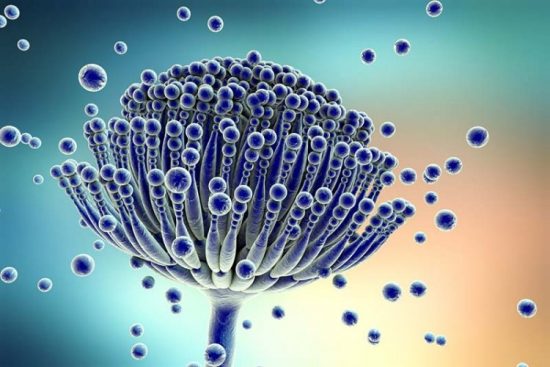In recent years, the role of environmental toxins in chronic health conditions has become a major focus of clinical research, with mould exposure identified as a major contributor to chronic, multi-system diseases. Mycotoxins produced by indoor moulds, such as Aflatoxins, Ochratoxins, and Trichothecenes, are now recognised as potent disruptors of immune, neuroendocrine, and metabolic systems. The pathophysiological complexity of mould toxicity, and its systemic effects, mean it is often missed or mis-diagnosed.
Pathophysiological Overview of Mould-Induced Toxicity
Mould exposure, particularly in water-damaged buildings, introduces a variety of mycotoxins and microbial volatile organic compounds (mVOCs) into the body. These bioactive compounds initiate complex biochemical cascades that disrupt immune function, induce systemic inflammation, and impact neuroendocrine pathways.
 Water damage can be minor and hidden from view, but the mould grows in wall cavities, in ceilings, carpets, etc in homes, workplaces and cars. If you reside in a humid or tropical environment, chances you have been exposed to mould. With extreme weather events around the world seeing homes inundated with flood waters, mould will be an issue.
Water damage can be minor and hidden from view, but the mould grows in wall cavities, in ceilings, carpets, etc in homes, workplaces and cars. If you reside in a humid or tropical environment, chances you have been exposed to mould. With extreme weather events around the world seeing homes inundated with flood waters, mould will be an issue.
Key Pathophysiological Mechanisms in Mould Toxicity
- Immune System Dysregulation and Chronic Inflammatory Response Syndrome (CIRS):
Mould-related illness is often driven by persistent immune activation and systemic inflammation. Mycotoxins such as trichothecenes and ochratoxins induce excessive release of pro-inflammatory cytokines and can lead to a sustained inflammatory state known as CIRS. This syndrome is frequently observed in genetically susceptible patients with HLA-DR haplotypes, who exhibit impaired toxin clearance and chronic inflammation. Identifying these patients and targeting the underlying immunopathology is critical for effective treatment. check with your qualified natural health professional for ethical DNA testing to see if you may be more vulnerable to mould exposure. - Neuro-immune and Neuro-inflammatory Effects:
Mycotoxins cross the blood-brain barrier, initiating neuroinflammatory processes that contribute to cognitive impairment, memory deficits, mood disturbances, and, in extreme cases, neurodegeneration. The interplay between cytokine-induced neuroinflammation and oxidative stress results in neuronal dysfunction and mitochondrial impairment. It is essential that both systemic inflammation and neuroinflammation are addressed when managing patients presenting with neurological symptoms secondary to mould toxicity. - Endocrine and HPA Axis Disruption:
Mould toxins have a profound impact on the hypothalamic-pituitary-adrenal (HPA) axis, leading to dysregulated cortisol secretion and adrenal insufficiency. These effects exacerbate symptoms such as chronic fatigue, mood instability, and impaired stress responses. The resulting hormonal imbalances, particularly in cortisol and thyroid hormone, must be carefully assessed and managed in patients with mould-related illnesses. - Mitochondrial Dysfunction and Oxidative Stress:
Mould exposure induces mitochondrial damage via increased production of reactive oxygen species (ROS) and direct interference with mitochondrial DNA. This contributes to energy deficits, muscle weakness, and exacerbation of fatigue in affected individuals. Supporting mitochondrial function through targeted antioxidant therapy is essential in treating complex cases of mould-related illness. - Gut Microbiome Disruption and Gastrointestinal Sequelae:
Mould exposure can cause significant dysbiosis, contributing to increased intestinal permeability (“leaky gut”) and gastrointestinal inflammation. This further exacerbates systemic immune dysregulation and metabolic disturbances. For complex cases, gut health restoration becomes a crucial aspect of a comprehensive treatment plan, including the use of specific probiotics, prebiotics, and dietary interventions.
Clinical Considerations for Complex Mould-Related Illness
Managing mould toxicity in complex cases requires a multi-faceted approach that addresses the root causes of immune dysregulation, detoxification impairment, and neuroendocrine disruption. A qualified naturopath trained in mould toxicity can offer treatment that is and based on advanced diagnostic assessments, including mycotoxin testing, genetic predispositions, and inflammatory markers.
Mould illness is serious and not isolated. Mould is pervasive. If you, or a member of your family, have developed symptoms that do not respond to treatment it may be worth having your premises assessed by a building specialist.
Watch this video: “Is your home making you sick?”


